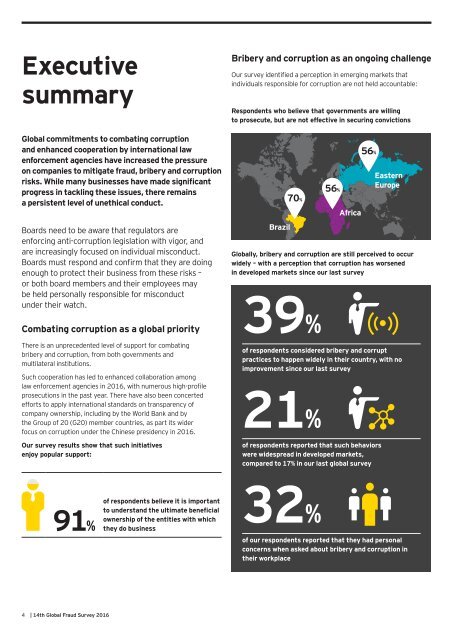Corporate misconduct — individual consequences
1VGrXvQ
1VGrXvQ
Create successful ePaper yourself
Turn your PDF publications into a flip-book with our unique Google optimized e-Paper software.
Executive<br />
summary<br />
Global commitments to combating corruption<br />
and enhanced cooperation by international law<br />
enforcement agencies have increased the pressure<br />
on companies to mitigate fraud, bribery and corruption<br />
risks. While many businesses have made significant<br />
progress in tackling these issues, there remains<br />
a persistent level of unethical conduct.<br />
Boards need to be aware that regulators are<br />
enforcing anti-corruption legislation with vigor, and<br />
are increasingly focused on <strong>individual</strong> <strong>misconduct</strong>.<br />
Boards must respond and confirm that they are doing<br />
enough to protect their business from these risks –<br />
or both board members and their employees may<br />
be held personally responsible for <strong>misconduct</strong><br />
under their watch.<br />
Combating corruption as a global priority<br />
There is an unprecedented level of support for combating<br />
bribery and corruption, from both governments and<br />
multilateral institutions.<br />
Such cooperation has led to enhanced collaboration among<br />
law enforcement agencies in 2016, with numerous high-profile<br />
prosecutions in the past year. There have also been concerted<br />
efforts to apply international standards on transparency of<br />
company ownership, including by the World Bank and by<br />
the Group of 20 (G20) member countries, as part its wider<br />
focus on corruption under the Chinese presidency in 2016.<br />
Our survey results show that such initiatives<br />
enjoy popular support:<br />
Bribery and corruption as an ongoing challenge<br />
Our survey identified a perception in emerging markets that<br />
<strong>individual</strong>s responsible for corruption are not held accountable:<br />
Respondents who believe that governments are willing<br />
to prosecute, but are not effective in securing convictions<br />
Brazil<br />
70%<br />
56%<br />
Africa<br />
56%<br />
Eastern<br />
Europe<br />
Globally, bribery and corruption are still perceived to occur<br />
widely – with a perception that corruption has worsened<br />
in developed markets since our last survey<br />
39%<br />
of respondents considered bribery and corrupt<br />
practices to happen widely in their country, with no<br />
improvement since our last survey<br />
21%<br />
of respondents reported that such behaviors<br />
were widespread in developed markets,<br />
compared to 17% in our last global survey<br />
91%<br />
of respondents believe it is important<br />
to understand the ultimate beneficial<br />
ownership of the entities with which<br />
they do business<br />
32%<br />
of our respondents reported that they had personal<br />
concerns when asked about bribery and corruption in<br />
their workplace<br />
4<br />
| 14th Global Fraud Survey 2016


